#ugaritic polytheism
Explore tagged Tumblr posts
Text
I'm here for goth girl Anat
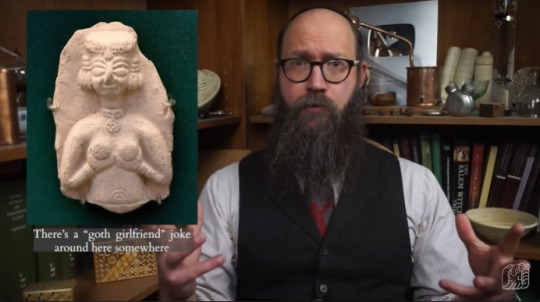
Are you?
#esoterica#anat#canaanite mythology#canaanite polytheism#ugaritic mythology#ugaritic polytheism#paganism#war gods#esoteric shitposting
13 notes
·
View notes
Text

I seriously don’t understand why more people aren’t talking more about this. I think it’s interesting!
https://academia.edu/resource/work/122323191
#AddsContext
(Academia.edu = #academic papers)
#CanaaniteReligion, #UgaritReligion, #El, #Yahweh, #polytheism, #monolatry, #monotheism, #HistoryOfReligion
#CanaaniteReligion#Canaanite Religion#UgaritReligion#Ugarit Religion#UgariticReligion#Ugaritic religion#El#Yahweh#polytheism#monolatry#monotheism#HistoryOfReligion#history of religion#comparative relligion#biblical scholarship
22 notes
·
View notes
Text
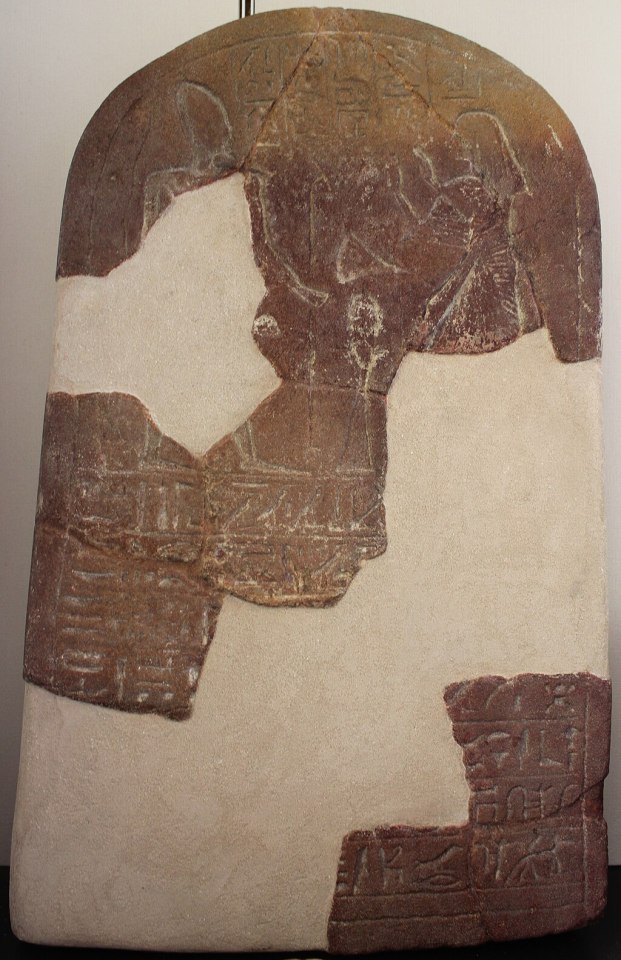
Stele of Set Sapouna (Baal Zephon) c. 1350 BCE Rash Shamra, Ugarit (modern Syria) Louvre Museum AO13176 A dedicatory stele by Maymi, the royal scribe, and former supervisor of the treasury, identifying the mountain/storm god Baal Zephon (Baalu Sapunu) with the Egyptian deity Set (Sutekh). Found within the temple of Baal-Hadad in Ugarit.
#baal#baal hadad#hadad#adad#beelzephon#set#seth#set deity#sutekh#canaan#canaanite gods#phoenicia#phoenician gods#aram#aramean gods#syria#syrian gods#levantine gods#hellenismos#mesopotamia#mesopotamian gods#ugarit#ugaritic gods#egypt#egyptian gods#kemeticism#kemetic#kemetic polytheism
62 notes
·
View notes
Text
Two myths from ancient Ugarit: Anat Binds the Dragon and Ashtart the Huntress
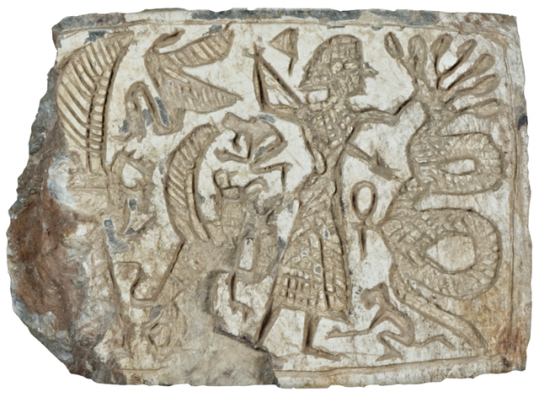
An early eighth century BCE stamp seal discovered at Tel Hazor depicting a Hero-Deity slaying a seven-headed serpent. Source: Uehlinger, Christoph. “Mastering the Seven-Headed Serpent: A Stamp Seal from Hazor Provides a Missing Link Between Cuneiform and Biblical Mythology”. Near Eastern Archaeology 87:1 (March 1, 2024), pp. 14–19. https://doi.org/10.5167/uzh-258353.
Hey folks, these are my versions of some fragmentary myths from the ancient Ugaritic corpus. A lot of what I used to fill in the blanks is based on other Ugaritic literature and I'm sure those with a lot more experience than me reading them will notice pretty quickly.
The first text, KTU 1.83, has been subject to quite some discussion among scholars in the past. I present it here to feature 𒀭Maiden Anat's slaying of the monstrous serpent Lotan (cf. Biblical “Leviathan”) and the Sea-God 𒀭Yam's other cohorts as She recalls in Tablet 3 of Ba'al. I primarily used the “provisional” translation of this text provided in Religious Texts From Ugarit (2nd edition, 2002, pp. 368–69) by Nathaniel Wyatt with credit as well to Wayne T. Pitard's edition titled “The Binding of Yamm” (J. Near East. Stud. 57(4):261–80, Oct. 1998) and Simon B. Parker's translation as “The Binding of a Monster” in Ugaritic Narrative Poetry (1997, pp. 192–93).
Next is KTU 1.92, somewhat more coherently narrating a hunt of 𒀭Lady Ashtart and 𒀭Lord Ba'al's passion for Her. My interpretation of this text has some more draw from general Semitic mythology and symbolism. Wyatt (pp. 370–74) is again my main source with further reference to Baruch Margalit's interpretation of the obverse text (Part I) as “A [sic] Ugaritic Theophagy” (Aula Orientalis 7:67–80, 1989).
I hope you enjoy these take on ancient stories of the Goddesses and Gods of Canaan 💛
Anat Binds the Dragon
When Lotan the Shifting Serpent burst forth with one lip to Heaven and one lip to Earth,
it was unleashed by 𒀭Desire, Beloved of 𒀭El, the 𒀭Rogue, the Bullock of 𒀭El,
by 𒀭Fire, the Bitch of 𒀭El, 𒀭Flame, Daughter of 𒀭El,
they came out from the Arsa;
with its fangs it thrashed the Sea to foam,
with its forked tongue it kissed the Heavens,
with its split tail it thrashed the Sea to foam.
𒀭Anat snared the Dragon on high,
She bound it on the heights of Lebanon.
Towards the desert shall You be scattered, O 𒀭Yam!
To the multitudes shall You be crushed, O 𒀭Nahar!
You shall not see: You shall foam up!
𒀭Anat will destroy You, O 𒀭Yam, Beloved of 𒀭El,
slay You, O 𒀭Nahar, the Great God.
She snared the Dragon and vanquished it,
destroyed the Shifting Serpent, the Tyrant of Seven Heads;
She destroys 𒀭Desire, Beloved of 𒀭El,
annihilates the 𒀭Rogue, the Bullock of 𒀭El;
She destroys 𒀭Fire, the Bitch of 𒀭El,
slays 𒀭Flame, Daughter of 𒀭El;
𒀭Maiden Anat battles for the Silver,
She takes possession of the Gold.
Ashtart the Huntress
Scribal note: Of Thabil.
Part I. The Hunt of Ashtart
𒀭Ashtart went out on a hunt,
She headed into the wild grazeland.
She polished the tip of Her Spear,
the Stars and the Crescent of the Moon favored Her bounty.
And lo! The hills began to shake,
the abysmal waters boiled up,
as a herd of antelope dashed off to the Marsh,
the swamp where buffalo graze.
She unsheathed Her Spear.
𒀭Ashtart sat and hid in the Marsh,
at Her right She placed Her Dog Crusher,
at Her left Boomer.
She lifted up Her Eyes and looked:
a drowsing Hind She espied,
a Bull eating in the pond She saw!
Her Spear She grasped in Her Hand,
Her Lance in Her Right Hand.
She hurled the Spear at the Bull;
She felled 𒀭Ba'al, Servant of 𒀭El.
As She went home She thought:
She would feed Him to 𒀭El the Bull, Her Father,
She would feed Him to the Sons of 𒀭Ashirat for dinner.
She would feed Him to 𒀭Yarikh's indomitable gullet,
She would serve the dinner to 𒀭Kothar-wa-Khasis, 𒀭Heyan the Ambidextrous.
Thereafter, when 𒀭Ashtart arrived at Her House,
She set away Her Implements of the Hunt.
Part II. Ba'al and Ashtart
𒀭Ashtart asked after the Guardian of the Vineyard
for She sought 𒀭El the Bull, Her Father, Master of the Vineyard.
She stood about the vines clad in a Veil of Linen,
donning an Aegis of Cypress, Lady 𒀭Ashtart,
the Kilt She wore catching the Splendor of the Male Stars,
Her Sash the Magnificence of the Female Stars.
Once the Maiden had changed,
𒀭Ba'al longed after Her;
the Valiant One wondered of Her Beauty!
𒀭Ba'al the Victorious desired to know Her by heart.
He was glad to see Lady 𒀭Ashtart, but She was frightened by the Son of 𒀭Dagan.
He heard Her cry peal across the Valley and the Coast,
past the Two Surs, beyond Sidon and Gebal,
echoing off Caphtor and Keilah,
Sapon and Nanaya brought low, Lalu and Inbubu brought high,
She lifted up Her Voice to the Guardian of the Vineyard,
𒀭Ba'al-Hadad called out:
“Seventy-seven times You have caught My Eye,
“eighty-eight pierced My Heart!”
But the Guardian answered Him:
“The City is guarded against Your Flesh.
“Do not return to the Court of the Sons of 𒀭El!”
Thereafter, 𒀭Ba'al went up to Sapon, His Holy Stronghold,
crushed the Heart of 𒀭Ba'al-Zebul for want of comfort of the living.
But lo! His Eyes lit up, He beheld His Lady with vessels of wine,
𒀭Ashtart the Heifer made feast with the Rider on the Clouds,
a supper of honeycomb and wine and all kinds of fish;
She opened the City Gates for 𒀭Ba'al the Victorious,
Standard raised in triumph for the Rider on the Clouds.
#semitic pagan#semitic paganism#canaan#canaanite#cananite pagan#polytheism#ugarit#ugaritic#mythology#myth#myths#baal#hadad#anat#ashtart#el#pagan#paganism#canaanite paganism#ugaritic mythology#polytheist#ancient near east#ancient history#history#ancient levant#bronze age#phoenicia#late bronze age#ancient religion#asherah
13 notes
·
View notes
Note
#and the worst part is…#sometimes you don’t have a choice(via@a-book-of-creatures) Yeah (:T
Hi, sorry if this has been asked before, but do you have any reliable sources that talk about Ashtar? I'm also looking for articles that talk about El/Ilu; and Shalim and Shahar as well. I appreciate any form of help.
I've answered a similar Ashtar question a few months ago, refer to the bibliography here. I do not have much to offer when it comes to Shahar and Shalim because as far as I can tell most scholarship focuses on exegesis of the Bible, which is something I have next to no interest in. I've answered a question about them here; the main source to depend on is Pardee's Ritual and Cult in Ugarit. When it comes to El, the basic selection of sources dealing with Ugaritic religion should obviously be the start: Smith's Baal Cycle commentaries, Pardee's aforementioned book, Rahmouni's Divine Epithets in the Ugaritic Alphabetic Texts, Handbook of Ugaritic Studies, etc. For more specialized information I recommend: a) Il in Personal Names by Alfonso Archi (early history, and why names with the element il and its cognates do not necessarily refer to a specific deity in pre-Ugaritic sources) b) West Semitic god El in Anatolian Hieroglyphic Transmission by Ilya Yakubovich for the first millennium BCE c) The God Eltara and the Theogony by Anna Maria Polvani for El's Hurro-Hittite career (there's also the Elkunirsa myth but I do not think there's any recent treatment of it, so your best bet is to just read the translation in Hoffner's Hittite Myths from the 1990s) d) The Dwelling of ˀIlu in Baˁlu and ˀAqhatu by Madadh Richey for some lexical considerations regarding El's residence e) God (Ilu) and King in KTU 1.23 by Theodore J. Lewis for El's role as the king of the gods
Also, it's worth checking out Wiggins' monograph A reassessment of Asherah: with further considerations of the goddess since while hardly focused on El, it does discuss Athirat's relationship with him in the Ugarit section. Similarly, might be worth looking into this author's Shapash article.
#yamayuandadu#Asherah#Ashtar#Ishtar#Shalim#Shahar#Canaanite Polytheism#Mesopotamia#Ugaritic Mythology#Mesopotamian Myth#Sources#informative reblogs
45 notes
·
View notes
Text
With A Martyr Complex: Reading List 2024
Adapted from the annual list from @balioc, a list of books (primarily audiobooks) consumed this year. This list excludes several podcasts, but includes dramatizations and college lecture series from The Great Courses, which I consume like a somewhat normal person this time around, but normally I'm a weirdo about them.
Myth in Human History by Grant L. Voth, from The Great Courses
Lud-in-the-Mist by Hope Mirrlees
Augustine: Philosopher and Saint by Phillip Cary, from The Great Courses
The Broken Sword by Poul Anderson
A Wizard of Earthsea by Ursula K. Le Guin
Democracy and Its Alternatives by Ethan Hollander, from The Great Courses
Sex in the Middle Ages by Usman T. Malik, from The Great Courses
The Pauper Prince and the Eucalyptus Jinn by Usman T. Malik
The Fellowship of The Ring by J.R.R. Tolkien
The Two Towers by J.R.R. Tolkien
The Return of The King by J.R.R. Tolkien
Tibet: History, Culture, Religion by Constance Kassor, from The Great Courses
Maoism: A Global History, by Julia Lovell
The Three-Problem by Cixin Liu, translated by Ken Liu
Doppleganger: A Trip Into The Mirror World by Naomi Klein
The Dark Forest by Cixin Liu, translated by Joel Martinsen
Would You Baptise an Extraterrestrial?...and Other Questions from the Astronomers' In-Box at the Vatican Observatory by Guy Consolmagno SJ and Paul Meuller SJ
Death's End by Cixin Liu, translated by Ken Liu
Other Minds: The Octopus, THe Sea, and The Deep Origins of Consciousness by Peter Godfrey-Smith
Ugaritic Texts: Ba'al Cycle, translated by the Scriptural Research Institute
The Gambler by Fyodor Dostoevsky, translated by Constance Garnett
Propaganda and Persuasion by Dannagal G. Young, from The Great Courses
Some Desperate Glory by Emily Tesh
War in the Modern World by David R. Stone
Bad Blood: Secrets and Lies in a Silicon Valley Startup by John Carreyrou
Fancy Bear Goes Phishing: The Dark History of the Information Age, in Five Extraordinary Hacks by Scott J. Shapiro
Ninefox Gambit by Yoon Ha Lee
The Great Gamble: The Soviet War in Afghanistan by Gregory Feifer
The Unbroken by C. L. Clark
Norse Mythology by Jackson Crawford, from The Great Courses
She Who Became The Sun by Shelley Parker-Chan
The Field of Blood: Violence in Congress and the Road to Civil War by Joanne B. Freeman
All Systems Red by Martha Wells
The Man Who Broke Capitalism: How Jack Welch Gutted The Heartland and Crushed The Soul of Corporate America--and How to Undo His Legacy by David Gelles
Monstrous Regiment by Terry Pratchett
God against the Gods: The History of Monotheism and Polytheism by Robert Garland, from The Great Courses
Raven Stratagem by Yoon Ha Lee
A Desolation Called Peace by Akrady Martine
The Autobiography of Benvenuto Cellini by Benvenuto Cellini, translated by John Addington Symonds
The Monster Baru Cormorant by Seth Dickinson
Moby Dyke: An Obsessive Quest to Track Down the Last Remaining Lesbian Bars in America by Krista Burton
When the Clock Broke: Con Men, Conspiracists, and How America Broke Up in the Early 1990s by John Ganz
Anything For A Vote: Dirty Tricks, Cheap Shots, and October Surprises in US Presidential Campaigns by Joseph Cummins
The Wicked and The Willing by Lianyu Tan
Perfume: The Story of a Murderer by Patrick Suskind
America after the Cold War: The First 30 Years by Patrick N. Allitt, from The Great Courses
The Aldo Moro Affaire by Jacopo Pezzan and Giacomo Brunoro, translated by a robot who could have done a better job quite frankly
Collapse: The Fall of the Soviet Union by Vladislav M. Zubok
The Shadow of The Torturer by Gene Wolf
Economics, 3rd Edition by Timothy Taylor
The Poetic Edda, translated by Jackson Crawford
Evgenii Onegin by Alexander Pushkin, translated by Mary Hobson (alternately titled Eugene Onegin)
Incomplete books: The Dragon: Fear and Power, Pilgermann, What Makes This Book So Great, Midnight's Children, Deng Xiaoping and the Transformation of China, Heaven and Hell, Maya to Aztec: Ancient Mesoamerica Revealed, The Last Emperor of Mexico, A Knight of the Seven Kingdoms, Autumn in the Heavenly Kingdom, Emperor of Japan
---
Great Courses consumed: 7
Non-Great Courses Nonfiction consumed: 19
---
Works consumed by women: 14 or 15 (C.L. Clarke uses both they and she pronouns, counting is hard)
Works consumed by men: 35 or 36
Works consumed by men and women: 1
Works that can plausibly be considered of real relevance to foreign policy (including appropriate histories): 10
---
With A Martyr Complex’s Choice Award, fiction division: Perfume: The Story of A Murderer
>>>> Honorable mention: The Dark Forest, Lud-in-the Mist, The Lord of The Rings, Ninefox Gambit, The Shadow of the Torturer, She Who Became The Sun, The Broken Sword, The Wicked and The Willing, All Systems Red
With A Martyr Complex’s Choice Award, nonfiction division: Collapse: The Fall of the Soviet Union
>>>> Honorable mention: War in the Modern World, Norse Mythology, The Man Who Broke Capitalism, The Autobiography of Benvenuto Cellini, Economics, When The Clock Broke
>>>> Great Courses Division: Tibet: History, Culture, Religion
The Annual “An Essential Work of Surpassing Beauty that Isn’t Fair to Compare To Everything Else” Award: Evgenii Onegin
>>>> Honorable mention: The Gambler
The “Reading This Book Will Give You Great Insight Into The Way I See The World” Award: The Gambler
>>>> Honorable mention: The Field of Blood: Violence in Congress and the Road to Civil War
Yes, okay? It IS Good After All and I was wrong to be a Hater: The Lord of The Rings
Best "Lesbian War Crimes" Book: Ninefox Gambit
Best Lesbian: Ma Xiuying (She Who Became The Sun)
Best War Crime: Mutually Assured Destruction by Antimatter Bullets (Death's End)
---
This year I got a bit better at reading non-audiobooks, thought not as much as I had hoped, but I feel as though if I were putting more time into it the divide could be overcome. However, I also read far fewer audiobooks this year, in part due to that same promotion at work, in part due to The Election, in part due to falling into bad habits. An easy goal for next year is just working on getting out of that habit. I did manage to hit my target at the end, at least.
I took up the intellectual project of reading "Lesbian War Crimes" Science Fiction/Fantasy books, which had a pretty dramatic effect on the layout of my books for the year. Suffice to say, picking up a contemporary genre is not as Good For Me as reading from wide sources which include international literature and The Classics. Some were real hits though.
My own creative output was not as large as I wanted but it was consistently of relatively high quality and originality, which I think was good. My attempt at a novel failed out of the gate, but I can take a stab at another one in the new year.
Goals for next year: learn some econ, more literary fiction, get a novel down
2 notes
·
View notes
Text
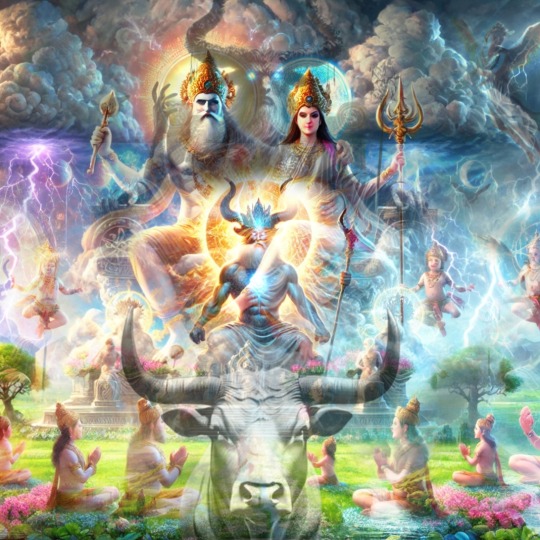
THE ORIGIN OF AN ARCHETYPE
Yahweh’s Origins in the Canaanite Pantheon
The earliest roots of Yahweh suggest that he was originally part of a broader Canaanite pantheon, where he was associated as a son of El, the chief god, and possibly identified with or influenced by Ba'al Hadad, the storm and fertility god. Far from being the sole deity of ancient Israel, Yahweh appears to have risen to prominence through a gradual process of religious evolution and consolidation.
1. Yahweh as a Son of El
In the ancient Canaanite religious structure, El was the supreme deity, referred to as the "Father of the Gods." Evidence suggests that Yahweh was initially seen as one of El’s divine offspring, a regional or tribal deity who later became the central focus of Israelite worship.
Evidence:
Deuteronomy 32:8-9: The Masoretic text states, "When the Most High [El Elyon] apportioned the nations, He divided humankind... Yahweh's portion is his people." This passage implies that Yahweh inherited Israel as part of a divine council presided over by El.
The term El Shaddai (often translated as "God Almighty") may also reflect a transitional phase where Yahweh was merged with the attributes of El.
2. Possible Synonymity with Ba'al Hadad
Ba'al Hadad, the Canaanite storm god, shares striking similarities with Yahweh in early depictions, including associations with storms, thunder, and fertility.
Evidence:
Both Yahweh and Ba'al are described as riding on clouds (e.g., Psalm 68:4, which calls Yahweh the "Rider on the Clouds," a title also given to Ba'al in Ugaritic texts).
Archaeological findings, such as inscriptions from Kuntillet Ajrud, mention Yahweh alongside "his Asherah," suggesting a connection to the goddess Asherah, who was also linked to Ba'al worship.
3. Polytheism in Early Hebrew Scriptures
The earliest Hebrew texts reflect a polytheistic worldview, with references to other gods and the divine council. Over time, these texts were edited to align with a monotheistic theology, but traces of polytheism remain.
Evidence:
Psalm 82: This psalm depicts a divine council where God (El or Yahweh) presides among other deities, judging them. "God has taken his place in the divine council; in the midst of the gods he holds judgment."
The commandment "You shall have no other gods before me" (Exodus 20:3) implicitly acknowledges the existence of other gods, suggesting that Yahweh was to be worshipped exclusively, not alone.
Names like Elohim (a plural term for "gods") were later interpreted as singular in a monotheistic context but originally reflected a pantheon.
4. Consolidation into Monotheism
The transition from polytheism to monotheism appears to have been driven by political and social factors, particularly during and after the Babylonian exile.
The Deuteronomistic reforms under King Josiah (7th century BCE) sought to centralize worship in Jerusalem and erase competing religious practices. This included the destruction of high places and Asherah poles.
The exile provided a theological crisis that led to the codification of Yahweh as the singular, omnipotent God.
Conclusion
The evidence points to a complex evolution of Yahweh’s role, from a regional deity within a polytheistic framework to the monotheistic God of Israel. This shift was not just theological but also political, aligning religious identity with national unity. Recognizing these origins challenges traditional narratives and opens the door to a deeper understanding of how religious truths were shaped—and sometimes suppressed—to serve institutional power.
From Horned Gods to Sky Fathers: The Evolution of Divine Archetypes
Long before the rise of Bronze Age deities like Yahweh, Ba'al, Zeus, and Odin—the archetypal "sky fathers" associated with storms and authority—Neolithic mythologies centered around a very different divine figure: the horned fertility god. This archetype, representing virility, nature, and the cyclical rhythms of life, was deeply intertwined with the earth goddess, symbolizing the balance of masculine and feminine energies. Over time, this primordial fertility god evolved into the storm-wielding patriarchs of the Bronze Age, reflecting a shift from earth-centered spirituality to a more hierarchical, sky-dominant religious structure.
Ba'al and the Horned God Archetype
Ba'al Hadad, the Canaanite storm and fertility god, embodies this transitional archetype. While known primarily for his dominion over storms and rain, Ba'al was also symbolically tied to fertility and often depicted with bull imagery—a clear link to the ancient horned god. Bulls, with their strength and virility, were revered as symbols of power and fertility in Neolithic cultures, and this symbolism carried over into Ba'al’s representation.
Evidence of Fertility Symbolism: Ugaritic texts describe Ba'al’s battles with the sea god Yam and the death god Mot, symbolizing the cycles of nature—fertility, drought, death, and rebirth. His victory over these forces ensures the fertility of the land, much like the earlier horned gods who presided over agricultural cycles.
The Tree of Life and the Balance of Archetypes
The evolution of these archetypes is mirrored in the structure of the Kabbalistic Tree of Life. Chokhmah, the first masculine expression of consciousness, represents not just wisdom but also the raw, creative force of fertility—the seed from which all life emerges. Binah, the cosmic mother, embodies the womb that receives and nurtures this creative force, shaping it into form. Together, they reflect the primordial balance of masculine and feminine energies that is foundational to existence.
Chessed and Geburah: This balance continues in the next set of Sephiroth—Chessed (mercy and expansion) and Geburah (severity and restraint). The merciful "All-Father," often depicted as a benevolent ruler or lawgiver, reflects Chessed, while Geburah embodies the divine force of discipline and justice. These archetypes are not inherently good or evil; they represent the necessary dualities that govern the universe.
The Removal of the Divine Feminine and the Corruption of the Archetype
However, as patriarchal religions solidified their power—particularly through the influence of institutions like the Church—the divine feminine was systematically erased from spiritual narratives. The goddess, once a co-equal counterpart to the god, was either diminished, demonized, or entirely removed. This unbalanced the archetypal framework, distorting the original harmony reflected in the Tree of Life.
The Beginning of Corruption: The removal of the divine feminine didn’t just suppress goddess worship; it fundamentally altered the nature of the masculine archetype itself. Without its balancing counterpart, the merciful All-Father became the authoritarian Demiurge, enforcing rigid laws without compassion. This corruption is mirrored in the transformation of the Sephiroth into the Qliphoth—the shadow side of the Tree of Life. The very forces that once guided humanity toward balance and enlightenment were twisted into tools of oppression and control.
A Preview of What’s to Come
In the next chapter, we will explore how this removal of the divine feminine set the stage for the widespread spiritual corruption seen throughout history. The Church's deliberate suppression of the goddess archetype not only severed humanity from a vital aspect of its collective consciousness but also paved the way for the distortion of spiritual truths. We will examine how this imbalance manifests within the Qliphoth, turning divine principles into their corrupted counterparts, and how reclaiming these suppressed archetypes is essential for restoring spiritual harmony.
#hermetic#hermetic philosophy#hermeticism#kabbalah#magick#occult#pagan#witches#truth#ancient wisdom#conspiracy theories
1 note
·
View note
Text
youtube
How did Yahweh Become God ? The Origins of Monotheism The rise of Monotheism has transformed the world and the helm of that transformation is the ancient Near East deity Yahweh. But, how did Yahweh, once only a god among gods, become simple God for billions of people? This episode explores the early rise of Yahwist monotheism in the Ancient Near East rom shifts in familial land relations, the rise of Imperial Assyrian Theology, monolatrous Yahwistic political concentration, the compression and mutation of the Bronze Age four-tiered Canaanite pantheon to Israelite Royal Theology, analysis of exilic-period Yahwistic theonyms on dozens of cuneiform tablets and even if monotheism emerges in Deutero-Isaiah or simply elaborate monotheistic rhetoric! This week's episode is going to an *hour* long exploration of the path from Canaanite polytheism to the first flickers of Yahwistic Monotheism before the Apocalyptic explosion. Consider Supporting Esoterica! Patreon - https://ift.tt/mNZxB42 Paypal Donation - https://ift.tt/f7CYbwS Merch - https://www.youtube.com/channel/UCoydhtfFSk1fZXNRnkGnneQ/store New to Studying Esotericism? Check out my Reading Guide here - https://ift.tt/MRgnsE7 Recommended Readings: The Early History of God: Yahweh and the Other Deities in Ancient Israel - https://amzn.to/4e6Bdo7 The Origins of Biblical Monotheism: Israel's Polytheistic Background and the Ugaritic Texts - https://amzn.to/3KJuD9X Canaanite Myth and Hebrew Epic - https://amzn.to/4549Net Beyond the Texts: An Archaeological Portrait of Ancient Israel and Judah - https://amzn.to/3X68eek Yahweh and the Gods and Goddesses of Canaan - https://amzn.to/3x86I0p God: An Anatomy - https://amzn.to/3VoQRD5 The Origin and Character of God - https://amzn.to/3V2agcx The Religions of Ancient Israel: A Synthesis of Parallactic Approaches - https://amzn.to/4e0cLVB Documents of Judean Exiles and West Semites in Babylonia in the Collection of David Sofer - https://amzn.to/4e0v1Ox Judeans in Babylonia A Study of Deportees in the Sixth and Fifth Centuries BCE - https://amzn.to/3V6dSdv Yahweh before Israel - https://amzn.to/3X3mUuE No Other Gods: Emergent Monotheism in Israel - https://amzn.to/3wXfDSp via YouTube https://www.youtube.com/watch?v=lGCqv37O2Dg
1 note
·
View note
Text
One of the Ugaritic snake-bite incantations lists the following divinities with their mountains or cult-sites: El on mount ks, Baal on sfipn (1.100.9), Anat and Athtart on ’inbb (1.100.20); and Dagan at ttl (Tuttul, 1.100.15), Resheph at bbt (1.100.31), Athtart at mr (Mari, 1.100.78) and perhaps Mlk at ‘ttrt (Ashtarot, 1.100.41), Yarih at lrgt (1.100.26), and ZfiZfi and KMT at hfiryth (1.100.36). The Ugaritic texts recogniz a distinction between home and foreign divinities and home and foreign cult-sites. Although Kothar wa-Hasis’s activities of weapon making (1.2 IV) and palace building (1.4 V–VII) clearly take place in the center, he has no mountain as his abode. Instead, he is said to dwell in Memphis and Caphtor (1.100.46), perhaps a reflection of the center of foreign culture and system of trade that brought artisans at Ugarit the materials necessary for their craft.
- the abodes of Ugaritic deities (in The Origins of Biblical Monotheism: Israel's Polytheistic Background and the Ugaritic Texts, by Mark S. Smith)
#polytheism#ugarit#biblical theory#religious studies#archeology#jewish studies#biblical studies#deities#ugaritic deities#worldbuilding#todaynerdyantlearnt
6 notes
·
View notes
Text
“The Canaanite (or, West Semitic) background of Israel’s culture extended to the realm of religion. This is evident from the terminology for cultic sacrifices and personnel. BH sacrificial language with corresponding terms in Ugaritic and/or Phoenician includes zebah, “slaughtered offering,” a biblical term applied to sacrifices in the cults of both Yahweh (Gen. 46:1; Exod. 10:25; 18:12; Hos. 3:4; 6:6; 9:4; Amos 5:25) and Baal (2 Kings 10:19, 24; cf. KTU 1.116.1; 1.127; 1.148; KAI 69:12, 14; 74:10); zebah hayyāmim, “the annual slaughtered offering” (1 Sam. 1:21; 2:19; 20:6; cf. KAI 26 A II:19-III:2; C IV:2-5); šělāmîm, “offering of well-being/greeting”168 (Leviticus 3; cf. KTU 1.105.9; 109; KAI 69:3; 51 obv.:5-6; 120:2); neder, offering of a vow (Numbers 30; Deuteronomy 12; cf. Ugaritic ndr, KTU 1.127.2; cf. mḏr, 1.119.30; KAI 155:1; 156; cf. 18:1; 45:1); minḥah, “tribute offering” (Lev. 2:1-16; cf. CIS 14:5; KAI 69:14; 145:12-13); kālîl, “holocaust” (Deut. 33:10; Lev. 6:15-16; 1 Sam. 7:9; Ps. 51:21; cf. Deut. 13:17; cf. KTU 1.115.10; KAI 69:3, 5, 7; 74:5).169 Other terms have been viewed as semantic equivalents in Hebrew and Ugaritic. It is assumed, for example, that BH ‘ôlāh (Leviticus 1; cf. judg. 11:30, 39) is semantically equivalent with Ugaritic šrp (KTU 1.105.9, 15; 1.106.2; 1.109); both denote an offering entirely consumed by fire. The ‘ôlāh sacrifice belonged not only to the cult of Yahweh in Jerusalem and elsewhere but also to the cult of Baal in Samaria (2 Kings 10:24; cf. ‘lt in KAI 159:8). A ritual of general expiation was not only an Israelite feature (e.g., Leviticus 16; 17:11; cf. Gen. 32:21 for a noncultic example); it was also a Ugaritic phenomenon (KTU 1.40).170 Both Ugaritic texts (1.46.1; 1.168.9) and biblical rituals (Leviticus 4-5) provide for divine forgiveness (*slḫl*slḥ). This incidence of highly specialized sacrificial terms suggests a common West Semitic heritage. Although other terminological parallels between Israelite and Ugaritic and Phoenician texts are found also in Mesopotamian culture, these links further mark the closely related Israelite and Canaanite cultures." - The Early History of God: Yahweh and the Other Deities in Ancient Israel, Mark S. Smith, Patrick D. Miller
4 notes
·
View notes
Text
2020 Goals: Keeping Up with the Iluma - ‘Ashuru Shamni
This year I started off with the Festival of Oil, ‘Ashuru Shamni. Beforehand, I randomly checked the Shanatu Qadishti from Tess Dawson’s (the founder of Natib Qadish) website for the New Moon/Full Moon/Festival dates. I had exactly 7 days from the date (1/2/2020) to prepare for ‘Ashuru Shamni. This is just one solitary Qadish doing what she can to celebrate the Ugarit/Canaanite Gods.
I bought the most expensive bottle of extra virgin olive oil I felt comfortable buying (on sale!). Then every night leading up to the date, I poured about an ounce of olive oil into a larger bottle, followed by about 21 drops of myrrh, then swirled it around. (Alas, extra virgin olive oil smells waaaaaaaay stronger than 21 drops of myrrh, and myrrh is not a weak smell, tbh).
To ritualize it and invite the Ilumas’ blessings, I searched youtube for ‘Canaanite music’ (usually brings up Near Eastern/Middle Eastern musicians) and ran that playlist. I then lit a candle to Choranu, inviting His aid and presence to purify me and the oil of any khat’sa (ritual/spiritual impurity, somewhat akin to the Greek idea of miasma). Then I would leave a drink offering for Choranu to enjoy while His candle burned. I also lit a candle to Ba’lu Hadad, because He is invoked during ‘Ashuru Shamni to bless the oil and to protect the city of Ugarit. Generally I would let the candles, oil and offering sit for at least an hour. I myself would do journaling or other quiet activities conducive to Their presence. Do this 6 more nights and you will have at least one half liter of olive oil and myrrh to have as a magical base for any other anointing oils.
For the actual night of ‘Ashuru Shamni, I fried up some fish fillets and latkes from Trader Joes. Got the music and candles going. Invited the Iluma by Their Names one by one (I invited Ilu, Athirat, Ba’lu Hadad, ‘Anat and Choranu). Blessed Their presence and presented the big bottle of myrrh oil I had been preparing.
I made the first pour (half an ounce) for Ba’lu Hadad, and added essential oils (EO) of myrrh and cedar (cedrus atlantica, smells SO nice). This time around, the EO stood out more than the olive scent. Then presented the fried food, and some pomegranate juice for Them. Lit the candle for Ba’lu Hadad and recited blessing prayers from Whisper of Stone and The Horned Altar (both by Tess Dawson) and my own prayers.
Then I sat and ate my own fried foods (yum). This next part was impromptu: I planned on saving the first oil I had poured out for Balu Hadad (now considered the Oil of Blessing for me). I had been planning on using the oil to bless and protect the thresholds of my place. I picked up the small dish--and got inspired to anoint every door frame. Just a dab, but at every door. (My roommate wasn’t home, and her door was closed. I dabbed her door anyway; she is understanding of my path and my ‘ways’, so I know she would not mind.) Also anointed every window that is able to open to the outside.
That done, I poured the remaining oil (still a lot) into a new bottle. It was messy and I spilled some in the sink. HOWEVER! I learned a very special protocol while cleaning this up; do not wash the oil away. It is not dirt. For clean up of this holy oil, I instead wiped it carefully with paper towel, then respectfully threw that in the garbage. Why this, I have no idea. I just know that once I needed to clean up, it was downloaded in my head as “do it THIS way, this is important”.
Thus done, I thanked the Iluma. The Iluma I invited by Name, I bid Them goodbye by Name as well. The ritual was then closed.
I want to be more organized and do more devotional activities for the Iluma this year. And inspiration is either faint, or it just downloads all at once for me, so reading what I do, please take with a grain of salt. I can say that I felt only good vibes/quiet approval of the ritual.
There were other things I wanted to do that I ended up abandoning;
crochet a special mat for Ba’lu Hadad (since it is His presence traditionally at the festival to bless the city) but didn’t use bc it wasn’t finished and it was lopsided.
Make other prayer oils at the time, and with other types besides olive oil. I even tried putting frankincense EO in, but when I tipped it, nothing came out (this is a full bottle btw). I felt that maybe They didn’t want/need it at the time.
#'Ashuru Shamni#Natib Qadish#Iluma#Ugaritic Iluma#Ugarit festival#Whisper of Stone#The Horned Altar#Canaanite Polytheism#DIY anointing oils#'Anat#Ba'lu Haddu#Ba'lu Hadad#Choranu#Ilu#Athirat#Shanatu Qadishti#Qadish
7 notes
·
View notes
Text
Vulture Deities of Ugarit
Vulture Deities of Ugarit
My family and friends in real life all know that I have a special love for scavenger animals. They are especially sacred to me as they fill a critical role in dealing with death – they are nature’s method of respecting the dead by handling the physical dead body in a similar way to how we humans burn or bury our dead. In America we find scavengers gross and even frightening, but when scavengers…
View On WordPress
7 notes
·
View notes
Text
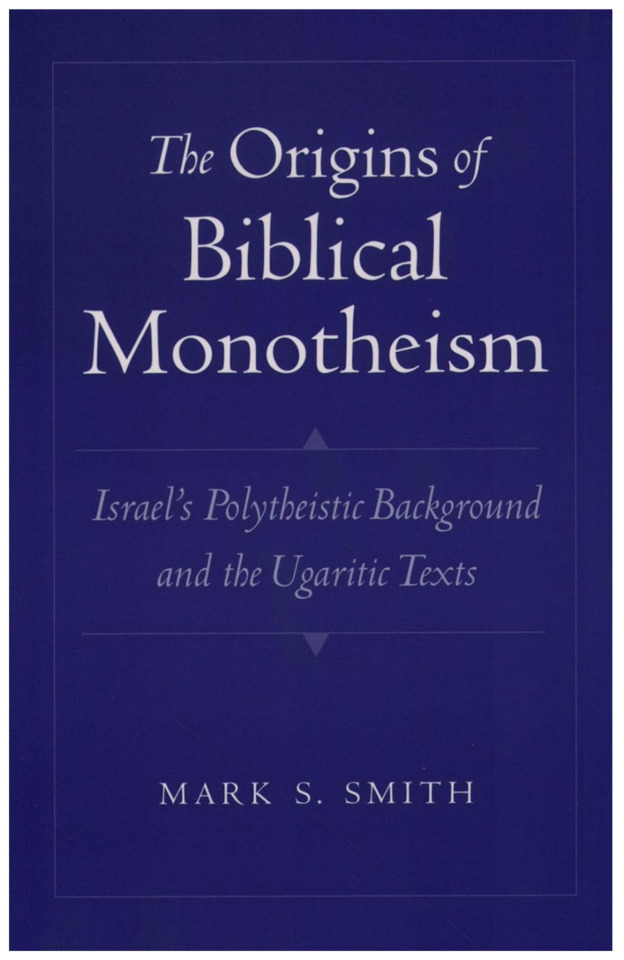
“The Origins of Biblical Monotheism: Israel's Polytheistic Background and the Ugaritic Texts” by Mark S. Smith is in my wish list.
0 notes
Text
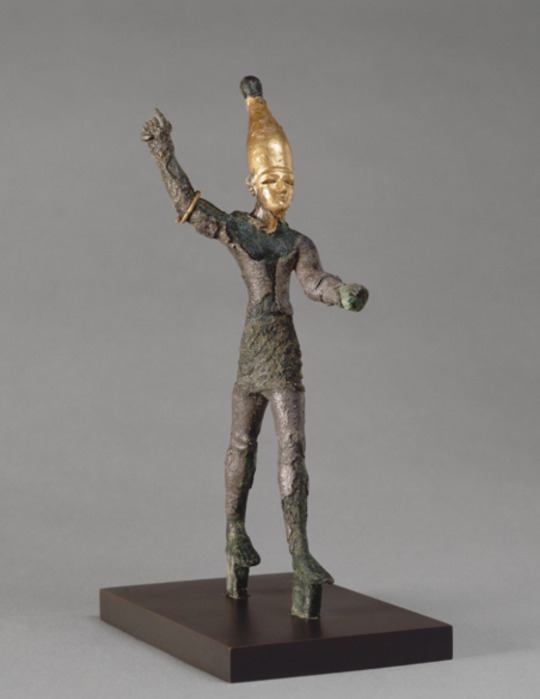
Bronze statue of Baal Hadad Ugarit, Syria c. 1200 BCE Source: The Louvre
#canaan#canaanite#canaanite paganism#canaanite polytheism#canaanite gods#phoenician#phoenician paganism#phoenician polytheism#phoenician gods#ugarit#ugaritic#aramean#aramean paganism#aramean polytheism#aramean gods#natib qadish#pagan#paganism#polytheism#magic#witchcraft#occult#baal#balu#hadad#hadu#baal hadad
68 notes
·
View notes
Text
Two prayers from ancient Ugarit
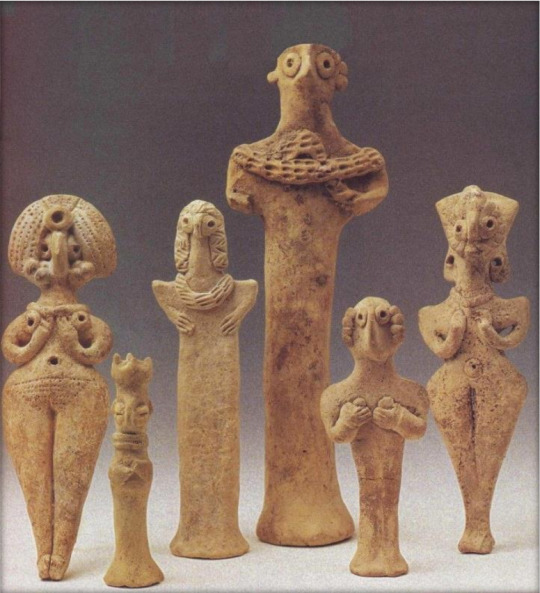
Various “Teraphim” figures representing deities for devotional purposes from ancient Canaan/Judah. Photo from “Exhibit from the Bible Lands Museum” (Biblical Archaeology Review Vol. 25:5 (Sep.–Oct. 2000), p. 22). Source: Fertility Goddesses from the Ancient Near East (Mar. 2000) by Wanda Roux, https://www.semanticscholar.org/paper/Fertility-goddesses-from-the-Ancient-Near-East-Roux/218a301d5b1f807dd2324e37257cc817912ceeed.
Shulmu 𒁲𒈬 to all! These are a couple more Ugaritic prayers I've given my own take on and filled in blanks based on scholarly texts. The first of these is addressed to 𒀭Prince Ba'al and is found appended to a bimonthly itinerary of Temple rituals classified as KTU 1.119 (=RS 24.266). My source for the text is Pardee 2002 (I mention these works often enough I figure I'll probably make a bibliography), pp. 50–53, 149–50 and the translation in Wyatt 2002, pp. 416–22. The next prayer, found on tablet KTU 1.65 (Wyatt 2002, pp. 363–65), also has a liturgical character and appears to have originally been concerned with the wellbeing of the a City of Ugarit. I've tried to adjust language in both prayers to make them flow as well as possible in English with a distinct ancient tone and I really hope you like what I've got here.
Prayer to Ba'al for Protection
When a terrible foe storms your gate,
a marauder dashes your walls,
You shall lift up your eyes to 𒀭Ba'al and say:
“O 𒀭Ba'al, if You drive the terrible foe from our gate,
“banish the marauder from our walls,
“an offering, O 𒀭Ba'al, we shall sanctify,
“a vow, O 𒀭Ba'al, we shall fulfill;
“a heritage, O 𒀭Ba'al, we shall sanctify,
“a Propitiation, O 𒀭Ba'al, we shall fulfill,
“a feast, O 𒀭Ba'al, we shall offer;
“to the Sanctuary, O 𒀭Ba'al, we shall ascend,
“the paths of the Temple, O 𒀭Ba'al, we shall follow.”
and 𒀭Ba'al will hear your prayer:
He will drive the terrible foe from your gate,
banish the marauder from your walls.
Prayer to El and the Family of the Gods
O Gods of the House of 𒀭El,
Family of the Gods,
Assembly of the Gods,
𒀭Thukamuna and 𒀭Shunama.
O 𒀭EI and 𒀭Ashirat,
Show us grace, O 𒀭El,
Come to our assistance, O 𒀭El,
Grant us peace, O 𒀭EI.
𒀭EI, come close,
𒀭EI, be our guard,
for the love of 𒀭Ba'al of Sapon,
for the hope in 𒀭Ba'al of Ugarit.
By the Holy Spear,
by the Holy Axe,
by the Holy Mace,
by the Holy Javelin.
By the Holy Burnt-Offering,
by the Holy Perpetual Offering,
by the Holy Morning Offering,
by the Holy Evening Offering.
By the Holy Censer and Lyre,
by the Holy Image and Propitiation,
by the Holy Threshold and Keystone,
by the Holy Song and Scribal Instruments,
by the Holy Grain-Offering and Young Wine.
O Gods of the Holy Mountain,
Gods and Goddesses in the Dwelling and Court,
remember us at the Assembly in Council,
by your rulings grant us peace in your good time.
#semitic pagan#semitic paganism#pagan#paganism#ancient history#ancient near east#history#canaanite paganism#canaanite pagan#canaan#canaanite#el#asherah#baal#gods#goddess#goddesses#spirituality#polytheism#polytheist#canaanite polytheism#ugarit#ancient levant#faith#religion#ancient religion#ancient world#phoenicia#bronze age#ugaritic
12 notes
·
View notes
Text

The Hebrew idea of "truth" (i.e., emet: אֱמֶת) is richer than factual description or “correspondence” between language and reality, since it contains moral implications and possibilities: what is true is also right, good, reliable (honest), beautiful, and sacred. The Hebrew word comes from a verb (aman) that means to "confirm" or establish, and the noun form (i.e, emunah: אֱמוּנָה, "faithfulness" or "trustworthiness") expresses the will to live by what is ratified, the “amen” of decision. The Hebrew concept is therefore existential: truth that is not lived is not really truth. Speaking the truth (dibbur emet) and abhoring dishonesty are considered foundational to moral life, as it says: "Speak the truth (דַּבְּרוּ אֱמֶת) to one another; render true and perfect justice in your gates" (Zech. 8:16). Yeshua said, "Amen, amen I say to you...." throughout his ministry to stress the reliability and certainty of God's truth (Matt. 5:18, 26, etc.). Indeed, Yeshua is called "the Amen, the faithful and true witness" (Rev. 3:14). In that sense truth is not a “what” of correspondence but rather a “who,” since reality turns on the magnetism of the divine presence (Col. 1:16).
The ancient Greek word translated "truth" is aletheia (ἀλήθεια), a compound formed from an alpha prefix (α-) meaning "not," and lethei (λήθη), meaning "forgetfulness." Greek scholars say the word lethei itself derives from the verb lanthano (λανθάνω), which means "to be hidden," so the general idea is that a-letheia (i.e., truth) is non-concealment, non-hiddenness, or (put positively) revelation or disclosure. Thus the word of Yeshua - His message, logos (λόγος), revelation, and presence - is both "unforgettable" and "irrepressible." Yeshua is the Unforgettable One that is manifest as the express Word of God (דְּבַר הָאֱלהִים). He is the Light of the world (אוֹר הָעוֹלָם) who imparts the "light of life" (John 8:12). Though God's message can be supressed by evil and darkened thinking, the truth is regarded as self-evident and full of intuitive validation (see Rom. 1:18-21).
Note that the LXX (i.e., the ancient Greek translation of the Torah and OT otherwise known as the Septuagint) dates from the time of the philosopher Plato, though of course the Hebrew text dates back to the time of Moses (13th century BC) and even earlier. About 300 BC, "Theophrastus," a student of Aristotle, wrote of the Jews that 'being philosophers by race, they converse with each other about the Divine." Abraham, who dates from about 2,000 BC, was the first avowed monotheist who openly repudiated the polytheism and idolatry of ancient Ugaritic culture (Abraham long predates the rise of Hinduism and the animistic hymns of the Vedas and their priestly commentary found in the Upanishads by a thousand years, just as ancient Judaism predates “Islam” by thousands of years). Similarly, both David and his son Solomon (10th century BC) wrote "existential" works of philosophy, predating the modern world by nearly 3,000 years... [Hebrew for Christians]
9 notes
·
View notes